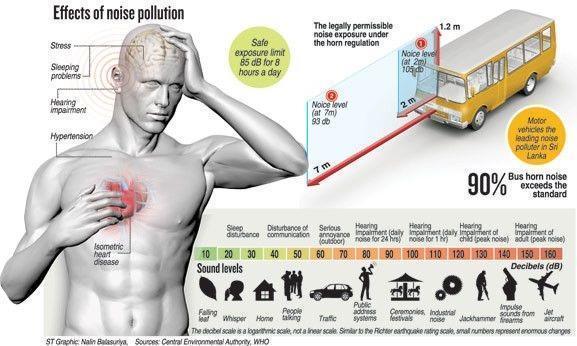
We are hurting our planet and it is hurting us back. This informed the World Health Day theme: “Our Planet, Our Health”. The environmental pollutants we release through different human activities are coming to haunt us.
Environmental pollution is a single or combination of toxic chemical, biological, or physical agents in the environment resulting from human activities that negatively impact the health of exposed subjects. Noise pollution is one of the environmental pollutions affecting humans. When air molecules surrounding our ears vibrate, parts inside the ear sense the changes in pressure. These parts amplify the vibrations and ultimately cause tiny hairs in the inner ear to bend. Bending those hairs creates nerve impulses that the brain perceives as sound.
The hairs can deform and return to their original position. However, if the vibrations are too strong, or if they last for an extended period, the hairs can be permanently damaged causing hearing loss. Not all noise is pollution; if it does not happen regularly, it may simply be termed as “nuisance”. Generally, any unwanted sound that our ears have not been built to filter can cause problems.
Impact of noise pollution on health
Mental and psychological effects
Noise leads to emotional and behavioural stress, as well as lack of concentration and mental fatigue ultimately leading to reduced productivity. Loud noise hampers sleeping patterns, causing irritation and discomfort. Exposure to intense levels of noise can cause personality changes and violent reactions. Other psychological effects of noise are irritability, depression and anxiety. Also, auditory stimuli may serve as psychological triggers for individuals with post-traumatic stress disorder (PTSD).
Physical/physiological effects
Cardiovascular effect: Noise increases the chances of illnesses like headache, blood pressure, heart failure, etc, occurring. Studies suggest that high intensity noise raises blood pressure and increases heartbeat rate because it disrupts the normal blood flow. Noise levels of 50 dB(A) at night may also increase the risk of myocardial infarction by chronically elevating cortisol production.
Hearing loss/disorders: A sudden loud noise can cause severe damage to the eardrum. Almost everyone has had one experience of being temporarily “deafened” by loud noise. This “deafness” is not permanent though. However, exposure to loud noises, either in a single traumatic experience or over time can damage the auditory system, resulting in hearing loss. Inadequate hearing protection or prolonged exposure to noise can result in either temporary or permanent hearing loss.
Noise induced hearing loss is sometimes unilateral and typically causes patients to lose hearing around the frequency of the triggering sound trauma. Hearing loss does not usually occur below 80 dBA (eight-hour exposure levels are best kept below 85 dBA), but most people repeatedly exposed to more than 105 dBA will have permanent hearing loss to some extent. Generally, hearing loss begins at 80- 90 dbA. Individuals who have hearing loss, including noise-induced hearing loss, may have their symptoms alleviated with the use of hearing aids.
Tinnitus: Tinnitus is an auditory disorder characterised by the perception of a sound (ringing, chirping, buzzing, etc.) in the ear in the absence of an external sound source. There are two types of tinnitus: subjective and objective. Subjective is the most common and can only be heard “in the head” by the person affected. Objective tinnitus can be heard from those around the affected person.
Social/psychosocial effects
Noise Interferes with normal auditory communication: High decibel noise may not allow two people to communicate freely. Also, it may mask auditory warning signals, hence increase the rate of accidents. Being in a noisy area constantly or often could also cause one to develop the habit of talking too loudly.
Annoyance: Excessive noise can provoke annoyance response. Sudden, impulse noises are typically perceived as more bothersome than noise from traffic of equal volume. Annoyance effects of noise are minimally affected by demographics, but fear of the noise source and sensitivity to noise both strongly affect the ‘annoyance’ of a noise.
Poor development in children: Noise poses a serious threat to a child’s physical and psychological health, and may negatively interfere with a child’s learning and behaviour. Evidence has shown that when children learn in noisier classrooms, they have more difficulties understanding speech than those who learn in quieter settings.
High noise levels have also been known to damage the physical health of small children. Children from noisy residences often have a heart rate that is significantly higher (by 2 beats/min on average) than those of children from quieter homes.
Noise pollution is not taken as seriously as other forms of pollution and this should change fast.










